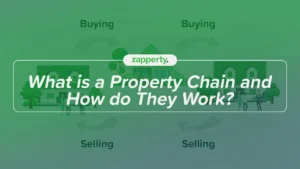Could you get on the property ladder without even moving?
We all know the benefits of owning a property. You get stability, control and a sense of security, especially in these uncertain housing markets. You also get the chance to build up equity without worrying about rent increases.
So, if you are already paying rent for a property, what is to say you can’t simply buy that property from your landlord? You’d think your rent would exceed what your landlord pays for their mortgage, so it should be affordable. It could be that buying a property you are already renting in the UK could be the answer?
But – is it really as simple as that? What about upfront costs, deposits, fees, ongoing expenses. What about the responsibilities that come with homeownership – insurance, maintenance, repairs?
Buying your Rental House
Firstly – if you’re a private rental tenant, can you ask to buy the property from your landlord? The answer is yes! You can ask. But it is up to them if they want to sell.
It’s not unusual for a landlord to sell a rented property in the UK. It makes financial sense for them and it’s a good way for you to get onto the property ladder. There are a few other great advantages.
- No estate agent fees
Because you’ll be buying the house directly from your landlord, you probably won’t need to go through an estate agent. So, your landlord won’t have to pay estate agency fees – and this could mean you get the property slightly cheaper.
- It saves time
As long as you’re happy with the property that you rent and its location, you won’t need to search the property markets for your next home. This’ll save you a lot of time researching, visiting various properties – so it’s a quick way to buy.
- There’s more chance of negotiation
Because your landlord knows you, you may be in a position to negotiate the asking price. Of course, they may still insist you buy the house at the market value – but there’s no harm in asking them to reduce the price in return for a quick, easy sale.
- No competition
As long as your landlord doesn’t want to sell the house on the open market, you don’t have to worry about competing buyers. And if this is your first time buying this could be an amazing option to get a great deal.
- No moving involved
Moving can be disruptive and expensive. But, as you’ll be staying put, you won’t have to experience the stress of packing, moving and unpacking. You won’t need to uproot your family and pets – no bags, boxes, removal vans – you won’t even need to say goodbye to the neighbours!
- Save money
There can be a host of fees involved with buying property. There will be no removal costs and potentially no fees from estate agents to worry about, and you’ll get your deposit back.
So what can you do to get the ball rolling?
- Ask!
Asking your landlord if they’re interested in selling is the obvious first step – you won’t get very far if they say ‘no.’
As a tenant, it’s probably wiser not to drop them a text out of the blue so have a proper conversation with your landlord in person or over the phone to get a rough idea of their thoughts on the matter.
They might have already been considering selling anyway as tax relief incentives have reduced dramatically over the last decade. Even if the landlord isn’t thinking of selling right now, it might plant the seed, and they may consider the possibility now you have shown interest.
Once you know your landlord is open to a potential offer, there are a few steps to take to ensure you have the right things in place before you take your first big step onto the property ladder.
- Find out how much the house is worth
Get an idea of the value of your rental property – it’s pretty easy these days. Property sites like Rightmove or Zoopla can give you an idea of how much similar properties in your area are actually selling for.
Of course, you could have an independent valuation done on the property – simply ask an estate agent.
It might be an idea to get the property surveyed too, as the value of the house might drop if there are any structural problems – and you want to know what you are letting yourself in for as once you buy, the upkeep falls on you, not your landlord!
- Assess your financial situation
Even if you can afford your rent, and that rent may be below the level of any mortgage, you will have other financial responsibilities as a home owner so make sure you know what you are working with. A frank, honest assessment will make sure you don’t get into something unsustainable.
You’ll need to budget for things including council tax, utility bills, buildings insurance, contents insurance and stamp duty.
- Get pre-approval for a mortgage
Applying for a Mortgage in Principle will mean you can confidently negotiate with the landlord.
- Make your offer and negotiate
If your landlord has already established that they’re willing to sell, now is the time to present them with a realistic figure that equates to the property’s market value. You should do this with a formal letter, backed up with a financial quote given to you by the people who valued the property.
Hopefully, the landlord will agree to the sale but if they try to negotiate the purchase price first, remember your budget and what you can and can’t afford.
Completing the Purchase Process
Buying your rented property is an exciting milestone. These final steps ensure the deal is legally binding and officially make your home yours. But what exactly does this process entail? And how can you navigate it smoothly? Let’s break it down step by step.
Step 1: Review and Finalise the Purchase Contract
Once you and your landlord agree on the sale terms, the next step is drafting a purchase contract. This document outlines key details like the agreed price, closing date, and any sale conditions. But here’s the catch—you need to comb through it carefully with a solicitor to avoid surprises.
Imagine agreeing to buy your rental property for £250,000, only to find later that the contract doesn’t clarify who handles essential repairs or covers closing costs. A good solicitor can help you ensure these terms are fair and transparent.
Quick Tip: Don’t rush this stage! A well-drafted contract is the foundation of a smooth buying process. Wouldn’t you rather catch issues now than deal with them later?
Step 2: Conduct Inspections and Surveys
Even though you’ve lived in the property, don’t skip a professional inspection or survey. Why? It’s your chance to uncover hidden problems that could affect your decision or the property’s value.
Take Hannah’s story: She was thrilled about buying her rental home until a survey revealed the roof needed replacing. Armed with this knowledge, she negotiated a £10,000 reduction on the purchase price. That’s the power of doing your homework.
Have you considered what surprises might be lurking in your property? A home inspection ensures you’re stepping into ownership with your eyes wide open.
Want to avoid hidden costs? Read more about why paying in cash could simplify your property purchase here.
Step 3: Handle Financial Transactions
This stage can feel daunting, but breaking it down makes it more manageable. Here’s what to expect:
- Deposit Payment: If you haven’t already, you’ll need to transfer your deposit to secure the purchase.
- Mortgage Transfer: Your lender will send the loan amount directly to your landlord or their solicitor.
- Closing Costs: Be ready to cover fees for legal services, stamp duty, and other charges.
Need help making sense of these costs? A mortgage adviser can clarify your financial responsibilities. For instance, if you’re selling another property to downsize, this might be the perfect time to reassess your financial strategy. Learn more about this in our guide to selling your house fast to downsize.
Pro Tip: Keep detailed records of all payments and documents to avoid last-minute hiccups.
Transfer Ownership
The final step—and the most satisfying—is transferring ownership. Your solicitor will register the property in your name with HM Land Registry. Once that’s done, congratulations! You’re officially the owner.
One buyer shared how emotional she felt seeing her name on the property title. It made all the effort worthwhile. Imagine that moment for yourself—what will you do first in your new home?
Key Consideration: Ensure all necessary documents (proof of identity, mortgage agreements, receipts) are ready before the closing date to avoid delays.
Exploring Purchase Options
Did you know that buying outright isn’t your only option? Depending on your financial situation and your landlord’s flexibility, alternatives like rent-to-own agreements could be worth exploring.
Rent-to-Own Agreements
A rent-to-own agreement allows you to rent the property for a specific period while building toward ownership. Part of your rent may even contribute to the purchase price.
Let’s say your landlord agrees to sell the property for £200,000. You’re paying £1,200 in monthly rent, with £200 of that going towards your future ownership. Over time, these contributions add up, making the eventual purchase more achievable.
Key Features:
- Option Fee: You pay an upfront fee to secure the right to buy the property at a predetermined price.
- Shared Responsibilities: You might handle minor repairs or maintenance while renting.
- Future Ownership: Rent payments contribute to the purchase price, easing the transition into ownership.
Does this sound like a good fit for your situation? It’s a flexible option if you need more time to save or secure financing.
Buying Directly from Your Landlord
Sometimes, buying outright is the simplest path. Many landlords prefer this option if they’re looking to free up assets quickly.
Why this could work for you:
- No Estate Agent Fees: You and your landlord save money by bypassing estate agents.
- Faster Process: You already know the property, so the transaction can move faster.
- Negotiation Opportunities: Familiarity with the landlord often leads to better terms, like a reduced price or flexible payment timelines.
One renter-turned-buyer shared how she negotiated a 5% discount simply by proposing a quicker closing date. Could you do the same?
Want more details? Read Buying Your Rented Property from Your Landlord.
Preparing Contingency Plans
Not all purchases go as planned, but having a Plan B can save you time and stress.
Consider Market Risks
The housing market can be unpredictable. What happens if property values suddenly drop or your financing falls through? Keeping an eye on market trends and exploring alternative strategies—like seller financing—can provide peace of mind.
One buyer faced a mortgage withdrawal due to shifting lender criteria. Instead of walking away, he negotiated a rent-to-own scheme with his landlord. This creative approach secured his future ownership.
Evaluate Financing Options
If traditional mortgages aren’t working, consider these alternatives:
- Shared Ownership Schemes: Buy a portion of the property and pay rent on the rest.
- Bridging Loans: Temporary loans to bridge financial gaps.
- Seller Financing: Some landlords may allow you to pay in instalments.
Have you thought about what you’d do if your mortgage fell through? Thinking ahead can save you from unexpected setbacks.
Securing Financing
Securing the right financing is a critical step. Here’s how to get it right:
1. Review Your Financing Options
Understanding your mortgage options helps you make informed decisions:
- Fixed-Rate Mortgages: Stability with fixed payments throughout the term.
- Variable-Rate Mortgages: Flexibility with payments that adjust based on market rates.
- Seller Financing: The seller acts as the lender, allowing installment payments.
Which option suits your financial situation best? Taking the time to compare can make a huge difference.
2. Apply for a Mortgage
The application process involves:
- Proof of Income: Submit payslips or tax returns to demonstrate earnings.
- Credit Check: A strong credit history improves approval chances.
- Pre-approval: Shows sellers you’re serious and ready to buy.
One buyer shared how getting pre-approved boosted their confidence in negotiations. Could pre-approval give you the same edge?
For more on mortgage timelines, read our guide: How Long Does a Mortgage Offer Last?
Whatever you do, you might want to get advice first!
Whether you are a landlord or a tenant, we can help you navigate the complexity of the property market – why not take a look at these pages and get in touch.




